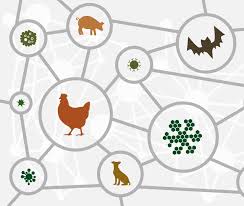Emerging infectious diseases. The INF-ACT Foundation is born, an integrated project to deal with/to respond to infectious emergencies.
25 members including universities, public and private bodies, including the Association of Experimental Zooprophylactic Institutes (AIZS). The University of Pavia is the leader, in collaboration with ISS and CNR.
The University of Pavia is the leader of an ambitious and wide-ranging project, but also of real scientific impact and with operational and organizational consequences, on the theme "emerging infectious diseases" which starts from the identification of the main current threats and those that could emerge in the future.
The project, developed by a proposing team characterized from the beginning by a strong synergy between the University of Pavia, the Institute of Health (ISS) and the National Research Council (CNR), has been selected by the Ministry of Universities and Research and funded with 114.5 million euros, under Mission 4, "Education and Research" - Component 2, "From research to enterprise" of the National Recovery and Resilience Plan (PNRR) - Investment Line 1.3, "Extended Partnerships", funded by the European Union - NextGenerationEU.
Thanks to this important funding, the INF-ACT Foundation is born, of which 25 national universities, public and private bodies belong. A consortium that provides strong transversal skills able to address the problem of possible epidemics by adopting a "One Health" approach, that is, integrating aspects of human health, animal health and the environment, from epidemic events to spillover phenomena to climate change underlying wildlife changes and human interactions.
The network of the 10 Experimental Zooprophylactic Institutes, represented by the AIZS Association , therefore has an important role in the prestigious network that will develop the INF-ACT, guaranteeing precisely that approach to Unique Health that is outlined in the different strands along which the research activities will develop.
Research topics
Five main themes have been identified that will be at the core of the operational synergy implemented by the Foundation:
• study of emerging and re-emerging viruses • study of insects and other vectors carrying pathogens and diseases related to them • study of antimicrobial resistant pathogens and mechanisms for the generation and exchange of pharmacoresistance markers • study of new integrated epidemiological and microbiological (human-animal-environmental) surveillance systems; identification of models for early detection of emerging infections; development of alert mechanisms and predictive mathematical models • identification of new targets for antinfective molecules; design, synthesis and validation of molecules with therapeutic potential with in silico, in vitro, ex vivo and animal models approaches.
The inaugural event of the INF-ACT Foundation was held in Pavia on 5 December 2022. It was the first real meeting in the presence of the representatives of all the members of the Foundation and also an important opportunity for scientific networking for the large team of researchers involved.
Members of the INF-ACT Foundation Public universities
Public bodies
Universities, IRCCS and other private entities
Source: IZSVe
© IZSAM December 2022
|
|
Istituto Zooprofilattico Sperimentale
dell'Abruzzo e del Molise "G. Caporale"
Campo Boario | 64100 TERAMO | ITALIA
Telefono 0039.0861.3321 | Fax 0039.0861.332251
e-mail: archivioeprotocollo@izs.it
Posta elettronica certificata: protocollo@pec.izs.it
Partita IVA: 00060330677
Codice Fiscale: 80006470670



